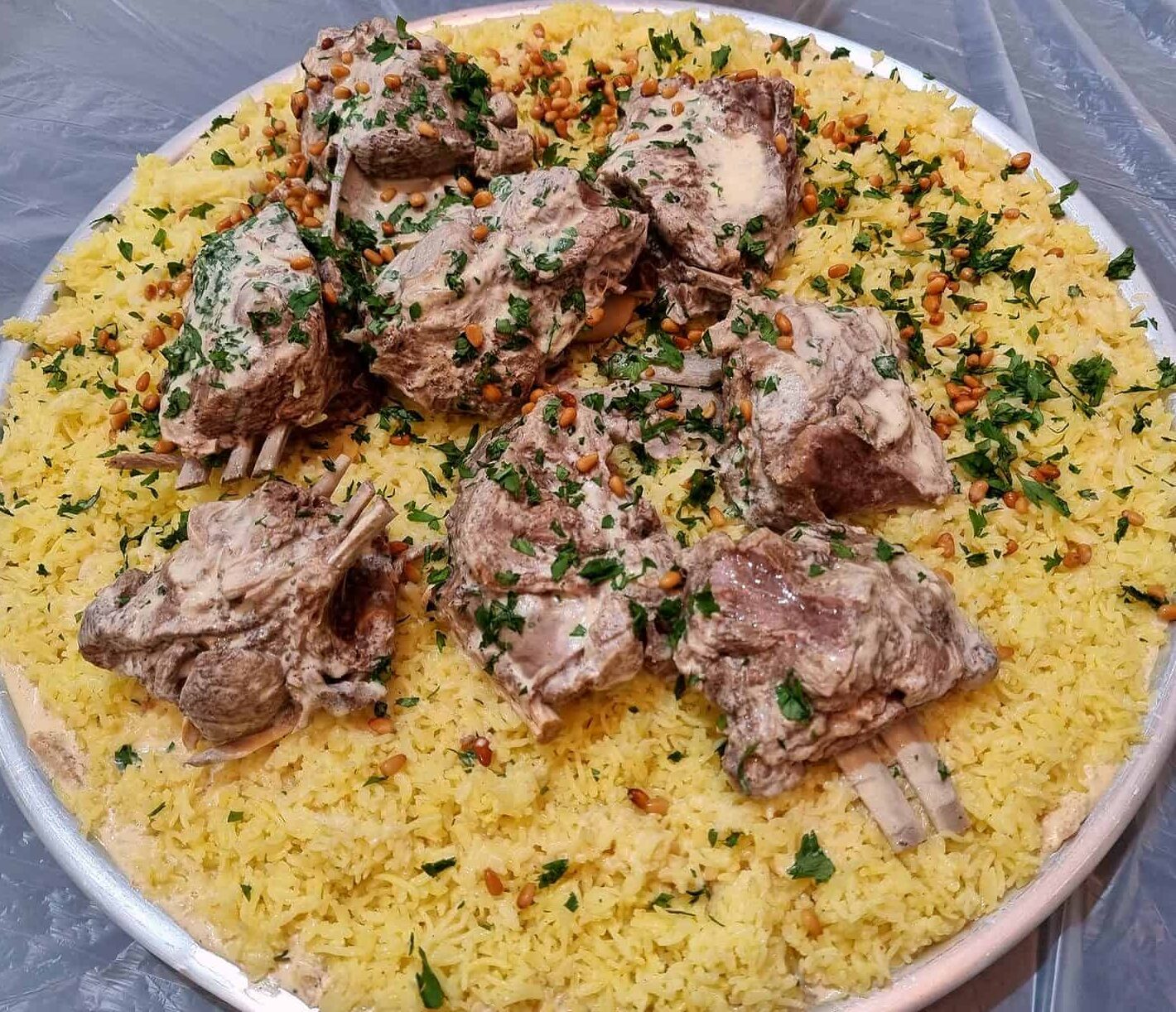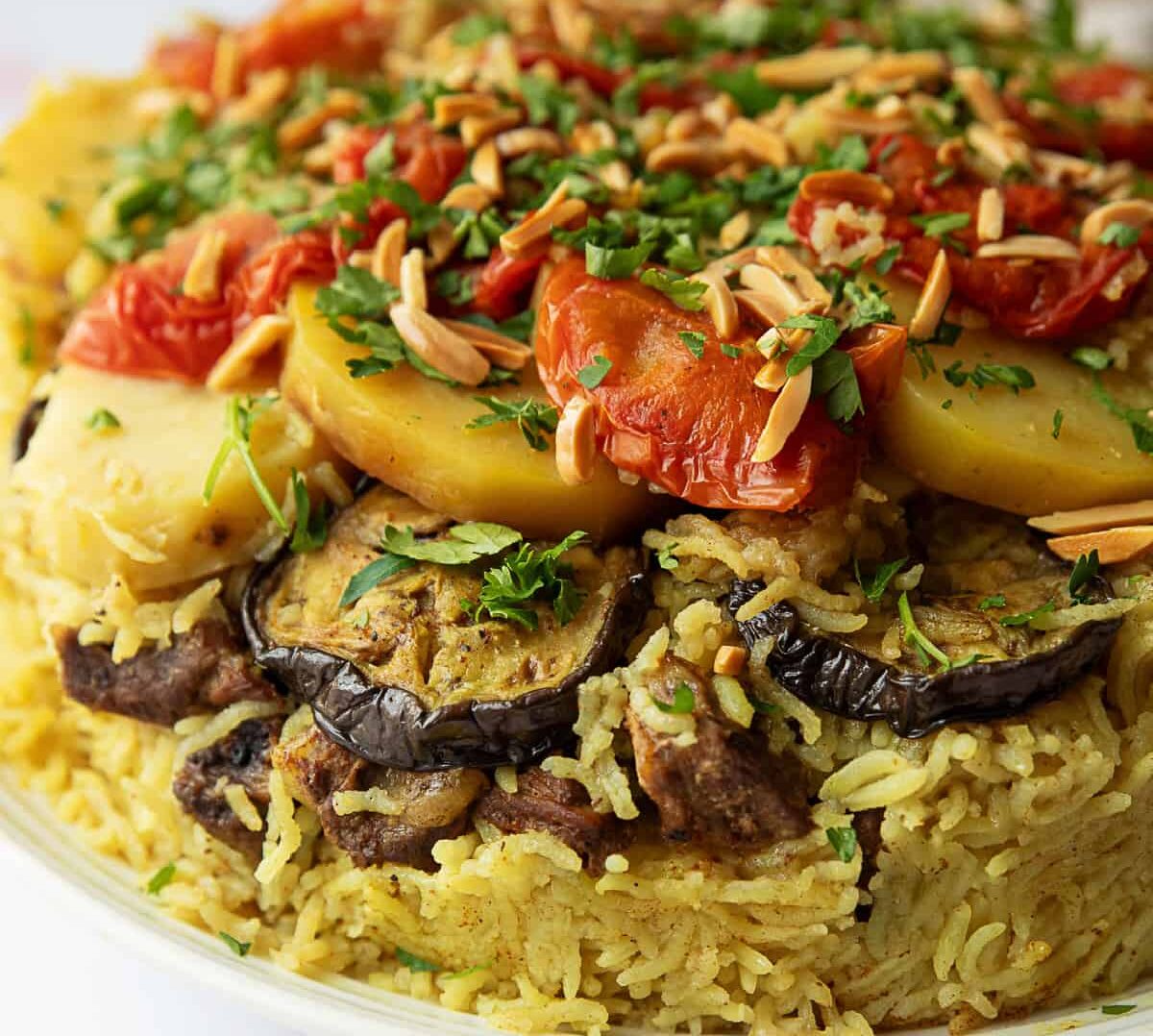Ramadan in Jordan is a special time marked by spiritual reflection and communal harmony. This sacred month sees families and communities come together, reflecting on faith and sharing resources. One of the most significant aspects of Ramadan in Jordan is the iftar meal, a daily breaking of the fast after sunset.
Iftar in Jordan is not just a meal; it’s an experience steeped in tradition and hospitality. The dishes served during iftar reflect Jordanian culture, bursting with rich flavors and aromatic spices. Common savory dishes include Mansaf, a flavorful combination of lamb cooked in a fermented yogurt sauce served over rice, and Hummus, a creamy blend of chickpeas, tahini, lemon, and garlic.
The sweetness of Ramadan iftar in Jordan is heightened with desserts like Kanafeh, a sweet cheese pastry soaked in sugar syrup, and Qatayef, stuffed pancakes typically filled with nuts or cream.
How Is Ramadan Observed in Jordan?
Ramadan in Jordan is a profound and joyous occasion filled with traditions and communal practices. As one of the holiest months in the Islamic calendar, Jordanians observe Ramadan with great enthusiasm and spiritual dedication.
The day begins before dawn with a meal called Suhoor, which sustains the day as Muslims fast from sunrise to sunset. This meal is often shared with family, reinforcing bonds and setting a serene tone for the day ahead. As the day unfolds, many Jordanians engage in prayer, reflection, and charitable activities, aligning with the essence of Ramadan, which focuses on faith, patience, and charity.
When the evening arrives, the fast is broken with the Iftar meal, which typically begins with dates and water, following the traditional practice of the Prophet Muhammad. Iftar is a festive time, often enjoyed with family and extended community members. Traditional Jordanian dishes like Mansaf, a savory lamb dish served with rice and yogurt sauce, are prevalent during this time. Tarawih prayers are performed at mosques as the night continues, bringing communities together in worship and spirituality.
In urban areas such as Amman, the capital of Jordan, the streets come alive after sunset. Ramadan nights are vibrant, with people visiting markets, cafes, and Ramadan tents, where special events, traditional music, and food are enjoyed. The spirit of Ramadan also extends to those in need, with many Jordanians actively participating in charitable endeavors to support the less fortunate during this holy month.
Overall, Ramadan in Jordan is a time when spirituality and community converge, highlighting the cherished traditions and the deep-seated values of togetherness and generosity.
What Are the Traditional Ramadan Customs in Jordan?
Ramadan, the holy month of fasting observed by Muslims, is celebrated with distinct customs and traditions worldwide. In Jordan, Ramadan holds a special place in the hearts of its people and is celebrated with unique cultural practices that embody both spirituality and community spirit. Here, we explore the traditional customs that define Ramadan in Jordan.
1. Fasting and Iftar Gatherings: Fasting from dawn until dusk is a core component of Ramadan. Each day during Ramadan, Jordanians break their fast with Iftar, a meal often shared with family and friends. This gathering includes an array of delicious traditional dishes like Mansaf, hummus, and dates. Many families invite neighbors and those in need to join them, fostering a sense of unity and caring.
2. Ramadan Decorations and Lanterns: The streets, homes, and mosques in Jordan are beautifully adorned with lights and colorful decorations during Ramadan. Lanterns, known as “fanous,” are significant symbols used widely during this time. They cast a warm glow, symbolizing hope and enlightenment.
3. Taraweeh Prayers: After Iftar, many Jordanians participate in Taraweeh, special evening prayers held at mosques throughout Ramadan. These prayers offer a communal space for spiritual reflection and are a staple in the daily Ramadan routine.
4. Community Spirit and Charity: Ramadan in Jordan emphasizes generosity and gives particular importance to charity. It is common for people to donate food, clothes, or money to the less fortunate. Charity tents, where the needy can receive free meals after a day of fasting, are a common sight in urban areas.
5. Cultural Events and Markets: During Ramadan, Jordanians enjoy various cultural events, including musical performances and poetry recitals. Souks (markets) are buzzing with activity, selling everything from food to traditional clothing. These marketplaces are vital to the Ramadan experience, offering a festive atmosphere that engages all senses.
6. Suhoor: Suhoor is the pre-dawn meal consumed before the fast begins each day. In Jordan, it includes simple, nutritious dishes to sustain individuals through their fast. Families often wake up together to enjoy this meal and share a sense of communal involvement.
In summary, Ramadan customs in Jordan are a blend of spiritual devotion and cultural tradition. The practices reflect the values of community, charity, and unity, making this holy month a time of peace, reflection, and celebration for Jordanians. Understanding these customs offers a glimpse into the rich cultural tapestry of Jordan, where the spirit of Ramadan is evident in everyday life.
What Are the Best Foods to Try During Ramadan in Jordan?
After a long day of fasting, Jordanian iftar tables are filled with various traditional dishes that are both flavorful and nourishing. Jordanian cuisine offers a unique Ramadan experience, blending rich flavors and aromatic spices that unite communities during this special month. From hearty dishes like Mansaf, a traditional lamb dish served with rice and topped with yogurt sauce, to sweet treats like Knafeh, a delicious pastry soaked in syrup, the culinary offerings will captivate your senses.
In this article, we’ll show you 8 of the best Jordanian dishes you must try during Ramadan.
Mansaf

Mansaf holds a special place in the heart of Jordanian culture, and its significance only deepens during the holy month of Ramadan. Renowned for its aromatic blend of seasoned lamb, yoghurt sauce, and saffron-stained rice, Mansaf is not only a culinary delight but also a symbol of hospitality and tradition. In the context of Ramadan, a month marked by fasting from dawn until sunset, the dish serves as a festive reward and a centrepiece for gatherings. Families and communities come together to break their fast with elaborate iftar meals, where Mansaf often takes centre stage, reflecting a deep-rooted tradition of sharing and togetherness. Emphasizing simplicity yet packed with flavours, this dish encapsulates the essence of Jordan’s rich heritage, drawing visitors and locals alike to experience its unique taste. During Ramadan, the celebration of Mansaf adds to the spiritual and communal spirit of the holy month, offering both nourishment and a sense of cultural identity for those who partake in this beloved tradition.
Maqluba

Maqluba, a traditional Levantine dish renowned for its tantalizing flavours and unique presentation, holds a special place in the culinary landscape of Jordan, especially during the holy month of Ramadan. Its name, which translates to “upside-down,” aptly describes the method of preparation, where a pot filled with layers of rice, vegetables, and meat is inverted to reveal a beautifully arranged dish. In Jordan, Maqluba takes centre stage at Iftar, the evening meal that breaks the daily fast. Families gather to enjoy this hearty, aromatic dish that symbolizes hospitality and unity, combining a rich tapestry of local ingredients like eggplant, cauliflower, and lamb or chicken. As the steaming plate is unveiled, it becomes more than just a meal; it’s a cultural tradition that embodies the spirit of sharing and community, essential values celebrated during Ramadan.
Lentil Soup
Lentil soup holds a special place in the culinary traditions of Jordan, especially during the holy month of Ramadan. As families gather to break their fast at Iftar, this nourishing and aromatic soup becomes a staple on dining tables across the country. Lentil soup, with its rich blend of spices and wholesome ingredients, not only soothes the palate but also provides essential nutrients needed after a long day of fasting. Its preparation can vary slightly from home to home, often reflecting the heritage and unique taste preferences of each family. Nevertheless, the common threads of cumin, coriander, and fresh lemon juice ensure a warm and inviting flavour profile. During Ramadan, lentil soup transcends its role as a mere meal; it becomes a symbol of comfort, unity, and shared tradition among loved ones. Whether enjoyed in the bustling city of Amman or the serene landscapes of rural Jordan, this hearty dish is a beloved feature of Ramadan evenings, making it a cherished and enduring part of Jordanian culture.
Sfeeha
Sfeeha, a cherished culinary delight, holds a special place in the hearts and kitchens of Jordanians, especially during the holy month of Ramadan. This succulent meat pie, with its origins rooted in the Levantine region, has become a symbol of familial and communal gatherings across Jordan. Ramadan, a month dedicated to fasting, reflection, and togetherness, sees a surge in the preparation and consumption of Sfeeha. The dish is celebrated for its rich, flavorful filling of spiced ground meat, typically lamb or beef, encased in a tender dough that is skillfully crafted and baked to perfection. In Jordan, the preparation of Sfeeha is more than just a culinary practice; it is a tradition passed down through generations, embodying the essence of Jordanian hospitality and culinary craftsmanship. During Ramadan, families come together to prepare this delectable dish, sharing it with loved ones and neighbours as part of the iftar meal when the daily fast is broken. The aroma of freshly baked Sfeeha, wafting through homes and souks, serves as an inviting reminder of the warmth, generosity, and togetherness that define the Ramadan experience in Jordan.
Atayef
Atayef, a beloved culinary delight, takes centre stage in Jordan during the holy month of Ramadan. This traditional Middle Eastern dessert, with its delicate pancake-like texture stuffed with sweet fillings, symbolizes festivity and communal spirit. As the sun sets and families gather to break their fast, Atayef becomes a staple on the iftar table. Whether filled with creamy cheese, nutty walnuts, or indulgent clotted cream, these treats are often savoured with a drizzle of sweet syrup. In Jordan, preparing Atayef is more than just a culinary practice; it’s a cherished tradition passed down through generations. It represents family togetherness, cultural heritage, and the joy of sharing during Ramadan. The aroma of Atayef wafts through bustling markets and homes, inviting residents and visitors alike to partake in this delightful Ramadan tradition.
Knafeh
Knafeh, a delectable Middle Eastern dessert, holds a special place in Jordanian hearts, particularly during the sacred month of Ramadan. In Jordan, this sweet culinary masterpiece, made from layers of thin noodle-like pastry or semolina, soaked in a sugary syrup, and generously topped with cheese or cream, becomes the centrepiece of iftar gatherings. As families and friends come together to break their fast, the sight and aroma of freshly baked knafeh in numerous bakeries and households elevate the celebratory spirit of Ramadan. Its significance goes beyond just indulgence; it symbolizes unity, tradition, and the sharing of joy and gratitude. Throughout the month, bakeries witness an increased demand, with long queues reflecting the dessert’s immense popularity. The making and savouring of knafeh during Ramadan in Jordan encapsulates a cherished ritual, blending rich flavours with deeper cultural meanings.
Fattet Hummus
Fattet Hummus is a beloved traditional dish in Jordan, especially cherished during the holy month of Ramadan. This delectable meal is a testament to the rich culinary heritage and social culture of the region. Made with layers of crispy bread and velvety hummus and often garnished with pine nuts and spices, Fattet Hummus serves not just as a meal but as a symbol of hospitality and togetherness. During Ramadan, as families gather to break their fast, this dish often takes centre stage at the dining table. Its preparation and consumption are steeped in tradition, making it a significant part of iftar, the evening meal. The historical roots of Fattet Hummus are deeply intertwined with Levantine cuisine, reflecting the region’s agricultural bounty and the community’s adaptive culinary skills. Through its delightful taste and nourishing qualities, Fattet Hummus embodies the spirit of Ramadan in Jordan, providing sustenance and joy after a day of fasting while also reinforcing cultural ties among families and communities.
Qatayef Asafiri
Qatayef Asafiri, a delightful Middle Eastern pastry, holds a special place in the hearts of Jordanians, especially during Ramadan. This traditional dessert, cherished for its unique texture and sweet fillings, is a staple in Jordanian households and food markets as families and friends gather to break their fasts. Originating from the rich culinary tapestry of the Levant, Qatayef Asafiri is prepared and enjoyed with zeal as the sun sets, marking the end of daily fasting. Its distinct half-moon shape, typically filled with creamy cheese or a mixture of nuts and sweetened with fragrant syrups, encapsulates the warmth and hospitality synonymous with Jordanian culture. The anticipation of savouring these pastries elucidates the spirit of Ramadan, where spirituality, community, and tradition converge harmoniously. Whether enjoyed plain or topped with syrup, Qatayef Asafiri continues to be an emblem of joy and festivity during the holy month, showcasing the beauty and allure of Jordanian gastronomy.
conclusion
Ramadan in Jordan is a time of faith, family, and flavorful food. From Mansaf to Atayef, Jordanian cuisine offers some of the best Ramadan delicacies that bring people together. If you’re ever in Jordan during Ramadan, don’t miss these delicious traditional dishes!
Explore More Delicious Ramadan Dishes:
Signature Ramadan Meals of Tunisia
Must-Try Ramadan Dishes in Algeria
Historical Ramadan Dishes of Egypt
Must-Try Ramadan Dishes in Qatar | Traditional Qatari Iftar Foods
Ramadan Foods Rich in Tradition from Sudan: Must-Try Dishes
Iconic Ramadan Dishes You Can’t Miss in Oman
